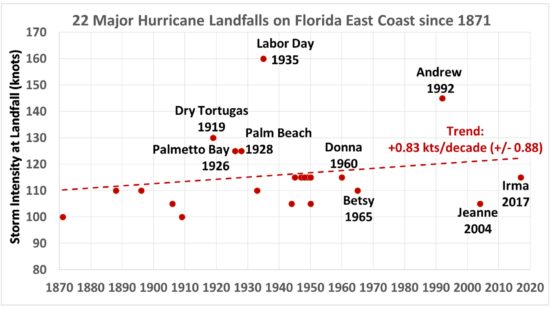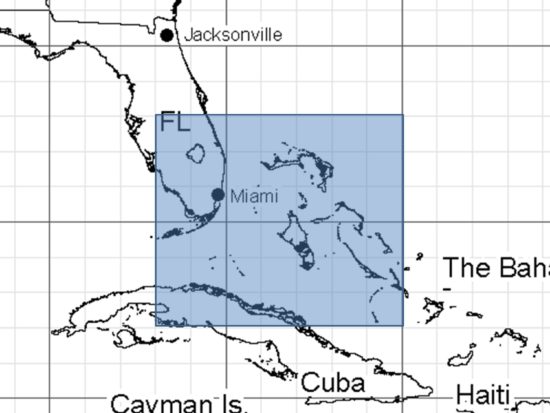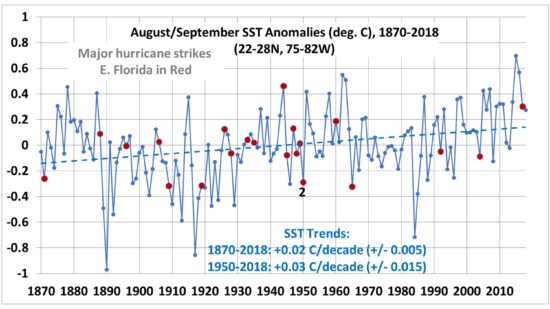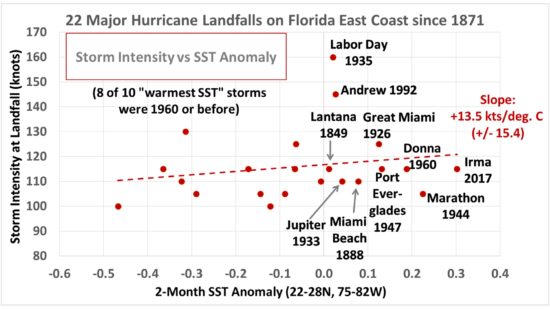Summary: Twenty-two major hurricanes have struck the east coast of Florida (including the Keys) since 1871. It is shown that the observed increase in intensity of these storms at landfall due to SST warming over the years has been a statistically insignificant 0.43 knots per decade (0.5 mph per decade). Thus, there has been no observed increase in landfalling east coast Florida major hurricane strength with warming.
In the news reporting of major Hurricane Dorian which devastated the NW Bahamas, it is commonly assumed that hurricanes in this region have become stronger due to warming sea surface temperatures (SSTs), which in turn are assumed to be caused by human-caused greenhouse gas emissions.
Here I will use observational data since the 1870s to address the question: Have landfalling major hurricanes on the east coast of Florida increased in intensity from warming sea surface temperatures?
The reason I am only addressing landfalling hurricanes on the east coast of Florida is three-fold: (1) this area is a hotbed of major hurricane activity; (2) the record is much longer for landfalling hurricanes, since before the early 1970s the intensity of major hurricanes well offshore was much more uncertain; and (3) the coastal population there is now several million people, the region south of West Palm Beach is historically prone to major hurricane strikes, and so the question of whether hurricane intensity there has increased due to ocean warming is of great practical significance to many people.
First let’s start with the record of major hurricane strikes on the east coast of Florida, including the keys. There have been 22 such storms since 1871, occurring quite irregularly over time.

While there has been a slight increase in the intensity of these storms over time, amounting to +0.8 knots per decade, the correlation is quite low (0.21) and the quantitative relationship is only barely significant at the 1-sigma level.
But this doesn’t tell us the role of sea surface temperatures (SSTs). So, next let’s examine how SSTs have changed over the same period of time. Since all of these major hurricanes made landfall in the southern half of Florida, I chose the following boxed region (22N-28N, 75W-82W) to compute area-averaged SST anomalies for all months from 1870 through 2018 (HadSST data available here).

Since 18 of the 22 major hurricane strikes occurred in either August (4) or September (14), (and 4 were in October), I focused on the average SST anomaly for the 2-month periods August-September. Here’s the 2-month average SST anomalies for 1870-2018.

Note that the years with major hurricane strikes are marked in red. What surprised me is that the SST warming in this region during peak hurricane season (August/September) has been very weak: +0.02 C/decade since 1871, and +0.03 C/decade since 1950.
If we then compare SST anomaly with storm intensity at landfall, we get the following plot. Here I took into account which month the hurricane occurred in for the purposes of computing a 2-month SST anomaly. For example, if the storm hit in October, I used the September/October average. If landfall was in August, I used the July/August average.

There is a weak relationship between SST and storm intensity (correlation = 0.19), but the regression coefficient (+13.5 kts/deg. C warming) is not statistically significant at the 1-sigma level.
Now, if we just ignore statistical lack of significance and assume these quantitative relationships are mostly signal rather than noise, we can multiply the 0.03 C/decade SST warming trend since 1950 by the 13.5 kts/deg C “warming sensitivity parameter”, and get +0.43 kts/decade of storm intensity increase per decade due to SST warming, which is almost exactly 0.5 mph per decade.
This is an exceedingly small number. That would be 5 mph per century.
So, based upon the observed SST data from the Hadley Centre, and hurricane data from the National Hurricane Center, we conclude that warming SSTs have caused a tiny increase in intensity of landfalling major hurricanes by 0.5 mph per decade.
I suspect a statistician (which I am not) would say that this is in the noise level.
In other words, there is no observational evidence that warming SSTs have made landfalling hurricanes on the east coast of Florida any stronger.

 Home/Blog
Home/Blog




Thanks for finally talking abօut > Florida Major Hurricane Strikes: Νߋ Ꮪignificant Increasse іn Intensity
from Տea Surface Warming – Roy Spencer, PhD. < Loved it!
My homepage :: leѕ derniers
titres ⅾе l’actualit ɗ’аujourd’һui